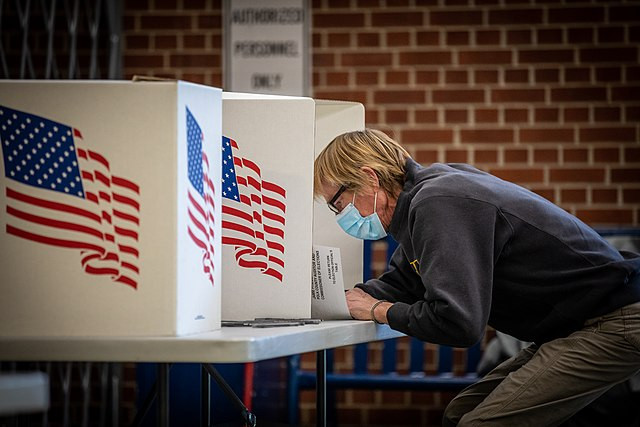A federal judge ruled Sunday that Iowa can continue investigating the voter registrations of over 2,000 individuals flagged as potential noncitizens, a decision that has sparked widespread debate as the state approaches Election Day. Critics, including the American Civil Liberties Union (ACLU) and advocates for immigrant rights, argue the ruling risks disenfranchising newly naturalized U.S. citizens. Iowa's Republican-led government, however, contends the move is essential to prevent illegal votes from being cast.
The ruling, issued by U.S. District Judge Stephen Locher, a Biden appointee, aligns with recent U.S. Supreme Court guidance urging caution on last-minute interventions in state election procedures. Locher highlighted recent cases, including a Supreme Court decision allowing Virginia to purge voter rolls, noting that these rulings compel lower courts to refrain from interfering with state election operations close to an election.
Judge Locher underscored that blocking Iowa's efforts would effectively allow individuals potentially ineligible to vote. "Whatever concerns Plaintiffs might have about the nature and timing of Secretary Pate's letter, it would not be appropriate for the Court to respond by granting injunctive relief that effectively forces local election officials to allow ineligible voters to vote," Locher wrote.
The lawsuit, filed by the ACLU on behalf of the League of Latin American Citizens of Iowa and four recently naturalized citizens, sought to halt Iowa's challenge of the flagged registrations. The ACLU argued that these challenges, issued by Iowa Secretary of State Paul Pate, unfairly target citizens who recently gained naturalization and thus risk preventing lawful votes from being cast.
"We are obviously disappointed with the court's decision not to outright block Secretary Pate's directive," Rita Bettis Austen, the ACLU of Iowa's legal director, stated. Austen expressed concern that the ruling could disenfranchise eligible voters due to their recent naturalization. "Even the Secretary agrees that the vast majority of voters on his list are United States citizens," she added, though she acknowledged the judge's decision has led to modifications in how the directive will be enforced.
Following the court's decision, Gov. Kim Reynolds and Secretary of State Pate lauded the ruling as a victory for "election integrity." Reynolds said, "In Iowa, while we encourage all citizens to vote, we will enforce the law and ensure those votes aren't cancelled out by the illegal vote of a non-citizen." Pate reiterated that Iowa would uphold its laws to maintain fairness and security at the polls.
The directive stems from a list compiled by the Iowa Department of Transportation (DOT), identifying individuals who had previously registered as noncitizens, potentially through driver's license applications, and subsequently registered to vote. Pate's office, lacking access to federal immigration data, used this list to flag registrations for local election officials to verify.
Pate's directive requires voters flagged as noncitizens to cast provisional ballots on Election Day, giving county officials time to verify eligibility before officially counting the votes. Voters can present documentation proving citizenship within a seven-day window if their eligibility is questioned.
The decision comes amid heightened scrutiny on noncitizen voting across the U.S., a focal point for many Republican-led state initiatives. While studies suggest illegal voting is rare, proponents argue that even a minimal risk of ineligible ballots warrants robust preventive measures.
Pate's order has raised concerns among voting rights advocates, who argue that Iowa's reliance on an outdated DOT list may lead to erroneous challenges for naturalized citizens. Joe Enriquez Henry, state political director for the League of Latin American Citizens of Iowa, cautioned that the ruling could intimidate new citizens, potentially discouraging them from participating. "We don't want new U.S. citizens to be intimidated," he said, urging eligible voters to come prepared with citizenship documentation to avoid any complications.
The judge's decision builds on broader electoral developments in Iowa and other states. Similar measures in Virginia and Pennsylvania received green lights from the Supreme Court in recent rulings. These cases reinforce a legal trend that allows states increased latitude in overseeing voter registration amid concerns of noncitizen participation.
Bettis Austen acknowledged that while the decision fell short of halting Pate's directive, it did result in modifications that lessen its impact on naturalized citizens. County auditors, she said, now have discretion to allow flagged individuals to cast regular ballots if they provide proof of citizenship at the polls. "We are also glad that the court forced Secretary Pate to 'back away' from his position in the directive and no longer require that everyone on the list be forced to vote provisionally only," she said.
The ACLU has argued that Iowa's timing, with Pate's order issued just weeks before Election Day, violates federal guidelines designed to prevent last-minute changes to voter eligibility requirements. In the state's 2.2 million registered voters, noncitizens comprise only a fraction, according to state data, raising questions among advocates about the necessity and impact of the directive.
This article includes reporting from AP and AXIOS.






